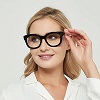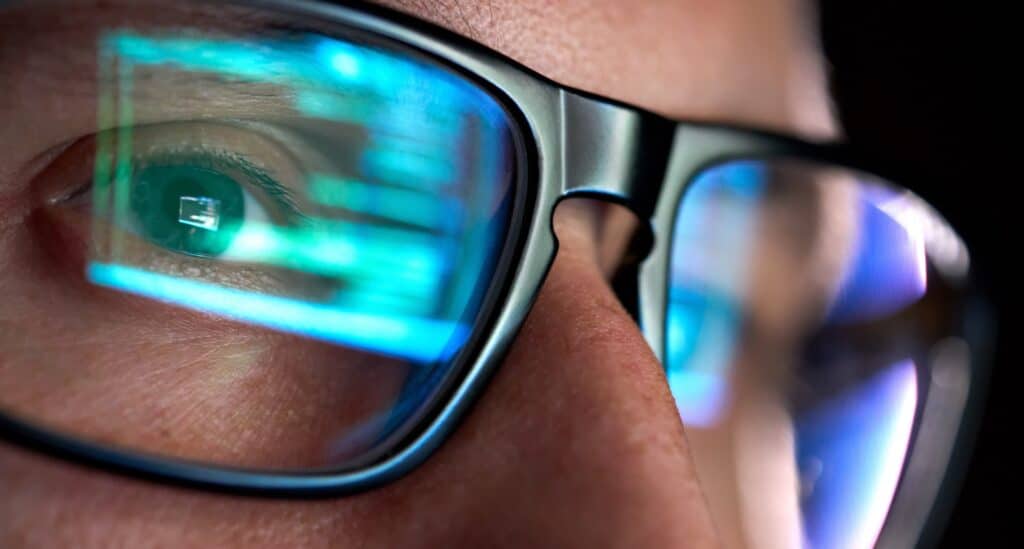Are Blue Light Glasses Effective? Here’s How to Find Out!
When we stare at our computers or phones, we often fail to consider how the blue light is affecting our eyes. The blue light your screen emits can potentially harm our eyes, particularly if we are looking at our computers for many hours at a time.
You can prevent digital eye strain and disturbed sleep by wearing blue light blocking glasses.
It’s no surprise that more and more people are opting for blue light filter glasses. However, you may wonder whether those glasses actually provide adequate protection from the blue light.
Is it harmful to your eyes to wear blue light glasses?
Some advertised blue light blockers and blue light computer glasses might not provide the level of protection they claim. Blue blocking glasses are not harmful for your eyes, so you can wear them all day without any issues.
It is necessary to conduct a test yourself in order to determine the amount of blue light your eyeglasses block.
How effective are blue light blocking glasses?
Blue light blocking glasses do work. However, there is a simple yet effective test you can perform to determine whether your blue light blocking glasses are effective or not.
You should be able to see the flashing blue light on top of emergency vehicles and police cars if you are wearing a pair of glasses that has an effective blue light filter lens.
Nevertheless, make sure you are aware of the color of the blue light-blocking lenses. Blue tinted glasses make everything appear blue, so the blue light will be less noticeable. The best blue light blockers have yellow, orange, or amber lenses. Glasses with clear lenses block about 20% of blue light (depending on the manufacturer), limiting the harmful effects of blue light. However, red lenses can affect your color vision, as well as block nearly the entire spectrum of blue light.
Are blue light filters effective?
Anyone who spends long hours working at a computer can benefit from the reduction of blue light caused by a blue light filter, which reduces blue light for an amount of 10-15%.
Blue light lenses or filters that are more advanced in design will appear amber in color. A blue light filter that is amber in color prevents excessive amounts of blue light from entering your eyes.
Are blue light rays harmful to the eyes?
The visible spectrum consists of a wide range of colors ranging from long-wavelength red light (700 nanometers) to short-wavelength violet light (380 nanometers). There is some high-energy blue light released by all light sources, including the sun and computer screens. Many of the adverse effects of “harmful blue light” are simply eye strain caused by staring at digital screens for too long.
In the event that you stare at a particular point for an extended period, you may forget to blink, which can result in you either having dry or watery eyes depending on whether your tear ducts are dry or overly lubricated.
The impact of blue light on sleep
One of the most common reasons for overusing screens is that blue light can affect sleep patterns. The blue light from the sun helps your body regulate its circadian rhythm, which determines when you should wake up and sleep. Inhibiting your circadian rhythm will result in insomnia and other sleep disorders if you focus on blue light from your screen.
In order to reduce this risk, you may want to use a blue light blocking screen protector or blue light blocking glasses.
Benefits of wearing blue light blocking glasses
A blue light blocking eyeglasses can provide a number of benefits, including:
-
Sleep patterns that are more regular
-
Eye strain is reduced
-
The risk of eye diseases is reduced
-
Migraines are less frequent
Macular degeneration is a potentially blinding condition that can potentially cause blindness if allowed to progress. Blue light glasses may also reduce the risk of contracting the disease. In contrast to ultraviolet light, blue light can reach your retina and may cause damage if you overuse your screen. By blocking blue light, you can protect your retina and potentially reduce the risk of cataracts.
However, the best blue-light-blocking glasses will also reduce brightness, reducing the likelihood of migraines. People who suffer from light sensitivity are usually advised to purchase lenses with an FL-41 tint. FL-41 glasses are usually rose or amber in color and will reduce screen brightness to reduce eye fatigue. A police car’s flashing blue light will also be blocked out by the amber tint of these glasses, so they will not only reduce light sensitivity but also blue light exposure.
What is the best time to wear blue light glasses?
When you wear blue light glasses late at night, you can prevent your internal clock from thinking that it is still daylight. Blue light is more likely to affect your sleep schedule in the evening or following sundown.
When blue light glasses are worn during the day, it reduces exposure to blue light, thus reducing the risks of eye strain, dry eyes, or other issues.
Occasionally, eye strain is caused by overuse of a computer screen. It is recommended to take breaks from your computer and try the 20-20-20 test (look 20 feet away from your computer for 20 seconds every 20 minutes) in order to reduce the strain on your eye.
Testing of blue light blocking glasses
When you conduct a blue light glasses test, you can determine if your blue light glasses are adequate or if they are even necessary. The flashing blue light of a police car will not be visible with glasses that block 100% of blue light. However, glasses that block only 10-15% of blue light may still permit you to see it.
A color wheel can also be used to test blue light blocking glasses. Simply look at the wheel and see whether the blue section looks black or dimmed. If the green portion of the wheel is dimmed, then your glasses also block green light, which disrupts melatonin production.
















